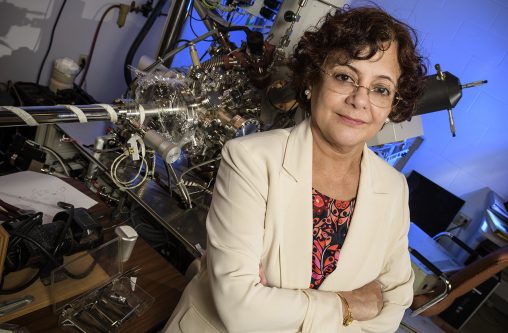
Sharmila M. Mukhopadhyay, professor of mechanical and materials engineering, directs Wright State’s Grand Challenges Scholars Program, which will prepare students to become future leaders capable of addressing challenges of the 21st century. (Photo by Erin Pence)
Wright State will become part of a national program designed to prepare and sharpen the focus of college undergraduates to become future leaders with deeper and broader understanding of how to address challenges of the 21st century — from clean water to cyberspace security.
The university was notified in November by the National Academy of Engineering that it was officially approved as a Grand Challenges Scholars Program school.
“This will put us on the map,” said Sharmila M. Mukhopadhyay, who will direct the Wright State program. Mukhopadhyay is professor of mechanical and materials engineering in the College of Engineering and Computer Science and director of the Center for Nanoscale Multifunctional Materials.
Mukhopadhyay proposed the program for Wright State after returning from a stint in Washington, D.C., where she served as a Jefferson Science Fellow of The National Academies of Science, Engineering and Medicine.
“The Grand Challenge Scholars Program is a natural fit for Wright State University,” said Brian Rigling, interim dean of the College of Engineering and Computer Science. “Its objectives echo the mission of the university, and the program structure is well-aligned with our own curricular priorities.”
Grand Challenges was launched in 2008 by three universities and has since grown to about 150 around the world. It is a combined curricular, co-curricular and extra-curricular program with five competencies — research and creativity, multidisciplinary, business and entrepreneurship, multicultural, and social consciousness.
“This kind of a program is something which is actually becoming the new paradigm for higher education, a bridge for any regional or national university to become a globally recognized one,” said Mukhopadhyay. “This is the future.”
Mukhopadhyay connected with the Grand Challenges program and its leaders while serving as senior scientific adviser at the State Department as part of her Jefferson Science Fellowship. She visited a large number of governmental and diplomatic agencies, research laboratories and top universities to create linkages between emerging technical innovations and inter-governmental as well as academic policies.
The 14 Grand Challenges fall under four themes — sustainability, health, security and joy of living. The challenges include:
- developing teaching methods that advance personalized learning
- making solar energy economical
- enhancing virtual reality
- reverse-engineering the brain to make advances in health care, manufacturing and communication
- engineering better medicines
- advancing the use of health information
- improving urban infrastructure
- securing cyberspace
- providing access to clean water
- providing energy from fusion
- preventing nuclear terror
- restoring balance to the nitrogen cycle with better fertilization technologies and by recycling waste
- capturing and storing excess carbon dioxide to prevent global warming
- engineering the tools of scientific discovery to understand the many unanswered questions of nature.
Mukhopadhyay said engineers and scientists have always been trained in technical things but often have had to pick up leadership skills along the way, something the Grand Challenges program will help provide from the start.
Today, she said, engineers and scientists can no longer solve the complex and multifaceted challenges of the 21st century in the isolation of their own comfort zone. They need multidisciplinary and business skills, a global perspective, multicultural understanding and social consciousness.
Mukhopadhyay said the Grand Challenges pathway will be incorporated into Wright State’s curriculum.
The program begins spring semester, is open for application by any undergraduate and will start slowly, with 10 or 15 selected students.
Students select one of the 14 Grand Challenges topics to focus on. Each student will have a faculty mentor and adviser to guide them, who will help them develop their portfolio through a variety of coursework and experiential learning options. While taking the general education and breadth courses required for their degrees, the students will select courses relevant to their topics and connect them in their portfolio.
Students must also take capstone design, research, experiential learning and service learning experiences that are connected to their selected topic.
“This is a great opportunity for students that would like to make themselves distinct,” said Rigling. “We greatly appreciate Dr. Mukhopadhyay’s vision and efforts in bringing this program to campus.”
The students who complete successful portfolios will graduate with a special honor, certified as Grand Challenge Scholars by the National Academy of Engineering.
“That’s a very big deal,” said Mukhopadhyay. “Employers are asking for graduates with concurrent technical depth along with leadership skills. This honor tells them you are not only an accomplished student, but also have the capability to connect the different components of your education across disciplines, cultures and new ideas, which is needed in effective leaders.”
Mukhopadhyay believes the program will produce a more responsible, mature and forward-thinking cohort of graduates.
“We have many students who could potentially become world-class leaders, and now we have an avenue to cultivate that acumen,” she said.

 Wright State celebrates homecoming with week-long block party
Wright State celebrates homecoming with week-long block party  Wright State baseball to take on Dayton Flyers at Day Air Ballpark April 15
Wright State baseball to take on Dayton Flyers at Day Air Ballpark April 15  Wright State joins selective U.S. Space Command Academic Engagement Enterprise
Wright State joins selective U.S. Space Command Academic Engagement Enterprise  Glowing grad
Glowing grad  Wright State’s Homecoming Week features block party-inspired events Feb. 4–7 on the Dayton Campus
Wright State’s Homecoming Week features block party-inspired events Feb. 4–7 on the Dayton Campus 